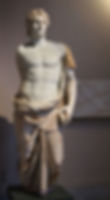The Virtue of Selflessness: Alexander the Great
- By Joe Archino
- Aug 2, 2019
- 3 min read

The virtue of selflessness lies at the heart of the true warrior. Across battlefields past and present, far and wide, the greatest fighters ever to walk the earth have led by example, showing that, “The group comes before the individual,” as noted by the author Steven Pressfield in The Warrior Ethos. Among many other valuable insights in his book, Pressfield offers three stories from the life of the ancient Macedonian ruler and titan of military conquest and leadership, Alexander the Great, that illuminate how selflessness fuels soldiers and armies. After all, there is a reason why Alexander, who became King of Macedonia at the age of 20 in 336 BC, was able to establish the largest empire that the ancient world had ever seen in a span of just 13 years, an empire that extended from the Balkans to modern-day Pakistan, stretching across three continents and covering nearly two million square miles. Alexander possessed many qualities that made him such an effective commander, but perhaps above all else, it was his selfless leadership that earned him the total devotion of his fighters and followers.
The following three passages are transcribed directly from The Warrior Ethos by Steven Pressfield.
Passage One
Once, Alexander was leading his army through a waterless desert. The column was strung out for miles, with men and horses suffering terribly from thirst.
Suddenly, a detachment of scouts came galloping back to the king. They had found a small spring and had managed to fill up a helmet with water. They rushed to Alexander and presented this to him. The army held in place, watching. Every man’s eye was fixed upon his commander. Alexander thanked his scouts for bringing him this gift, then, without touching a drop, he lifted the helmet and poured the precious liquid into the sand. At once, a great cheer ascended, rolling like thunder from one end of the column to the other. A man was heard to say, “With a king like this to lead us, no force on earth can stand against us.”

Alexander the Great refusing water in the desert by Tom Lovell. (Photo Credit: American Gallery)
Passage Two
There’s another story of Alexander. When he was getting ready to march out from Macedonia to commence his assault on the Persian Empire, he called the entire army together, officers and men, for a great festival at a place called Dium on the Magnesian coast.
When all the army had assembled, Alexander began giving away everything he owned. To his generals he gave great country estates (all properties of the crown); he gave timberlands to his colonels, fishing grounds, mining concessions and hunting preserves to his midrank officers. Every sergeant got a farm; even privates received cottages and pasturelands and cattle. By the climax of this extraordinary evening, his soldiers were begging their king to stop. “What,” one of his friends asked, “will you keep for yourself?” “My hopes,” said Alexander.

A famous mosaic dating back to around 100 BC or earlier, depicting Alexander the Great at the Battle of Issus in northwestern Syria in 333 BC. Today, the mosaic is located at the National Archaeological Museum of Naples in Italy. (Photo Credit: Wikimedia Commons)
Passage Three
Another time, Alexander’s army was struggling through the mountains in the dead of winter. One old soldier came straggling into camp, so frozen from the blizzard that he could no longer see or hear.
Troops around the fire cleared a seat for the veteran, prepared hot broth for him and helped thaw him out. When the ancient soldier had recovered enough to comprehend his surroundings, he realized that the young warrior who had given him his seat by the fire was Alexander himself. At once, the veteran leapt to his feet, apologizing for taking the king’s place. “No, my friend,” said Alexander, setting a hand on the man’s shoulder and making him sit again. “For you are Alexander, more even than I.”

Statue of Alexander the Great dating back to the 3rd Century BC and currently located at the Istanbul Archaeology Museum in Turkey. (Photo Credit: Wikimedia Commons)
Sources
Ancient World Magazine: The Alexander Mosaic.
BBC: Alexander the Great.
History.com: Alexander the Great.
History of Macedonia Blog: Alexander the Great Biography.
Livescience.com: Alexander the Great.
The Warrior Ethos by Steven Pressfield.
UShistory.org: Alexander the Great.











